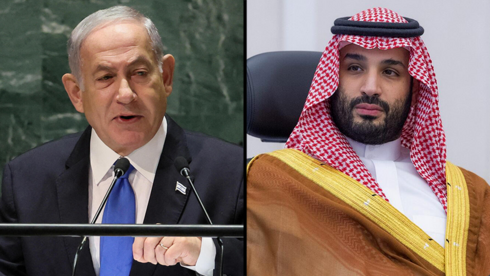Saudi Arabia has strongly dismissed Israeli Prime Minister Benjamin Netanyahu’s recent suggestion that the kingdom should host a Palestinian state on its territory. The comments have triggered widespread condemnation across the Arab world, with many viewing them as an insult to Palestinian sovereignty and an attempt to erase their right to an independent homeland.
Netanyahu’s Controversial Proposal

The controversy arose when Netanyahu made remarks during an interview on Israel’s Channel 14. During the discussion, an interviewer mistakenly referred to a “Saudi state” instead of a “Palestinian state.” Seizing on the moment, Netanyahu responded by suggesting, “The Saudis can create a Palestinian state in Saudi Arabia; they have a lot of land over there.”
While the remark was delivered casually, it was perceived as a serious proposal and quickly ignited backlash. Many Arab leaders and organizations condemned the suggestion, seeing it as an attempt to further marginalize Palestinians and ignore their historical rights to their homeland. Netanyahu’s words also raised concerns about whether Israel was trying to shift the Palestinian issue away from its borders while avoiding real engagement in the peace process.
Saudi Arabia’s Strong Response
Following Netanyahu’s remarks, the Saudi Foreign Ministry swiftly issued a statement rejecting the idea outright. The statement emphasized Saudi Arabia’s “categorical rejection” of any suggestion that Palestinians should be relocated from their rightful homeland.
“The Kingdom affirms its unwavering stance that the Palestinian people have the right to establish their independent state on the 1967 borders, with East Jerusalem as its capital,” the statement read. “Any attempt to disregard or undermine this right is unacceptable.”
Saudi Arabia has long been a key supporter of the Palestinian cause, advocating for a two-state solution based on internationally recognized agreements. The kingdom has also played a central role in diplomatic efforts to resolve the Israeli-Palestinian conflict, particularly through the Arab Peace Initiative, which was first proposed by Saudi Arabia in 2002.
Wider Arab and International Condemnation
Netanyahu’s remarks did not only provoke Saudi Arabia; they also led to criticism from several other Arab nations and organizations. The Arab League labeled the statement “irresponsible and dangerous,” warning that any effort to relocate Palestinians to another country would violate international law and human rights.
Egypt’s Foreign Ministry also issued a statement condemning Netanyahu’s remarks, saying they “disregard the legitimate and historical rights of the Palestinian people.” Meanwhile, Jordan, which has been a vocal advocate for Palestinian statehood, called Netanyahu’s comments an “attempt to distort the core issue at hand.”
Beyond the Arab world, international voices also weighed in. Several diplomats and human rights organizations criticized Netanyahu’s rhetoric, arguing that it undermines peace efforts and the pursuit of a fair solution to the conflict. The United Nations reiterated its stance that the Palestinian issue should be resolved through negotiations based on the pre-1967 borders.
Regional Implications and Tensions
Netanyahu’s remarks come at a sensitive time in Middle Eastern diplomacy. Over the past few years, Israel has pursued normalization deals with several Arab nations under the Abraham Accords, with hopes of eventually securing formal diplomatic ties with Saudi Arabia. However, Saudi officials have made it clear that any normalization with Israel would require progress toward a just resolution for the Palestinians.
Saudi Arabia has consistently maintained that it will not establish full diplomatic relations with Israel unless a viable two-state solution is implemented. Crown Prince Mohammed bin Salman has reiterated this stance in multiple public statements, emphasizing that the kingdom supports Palestinian statehood and will not compromise on that position. Netanyahu’s comments, therefore, threaten to strain Israel’s outreach efforts in the region.
Furthermore, Saudi Arabia’s rejection of Netanyahu’s proposal reinforces the broader Arab consensus that the Palestinian issue cannot simply be displaced or ignored. The kingdom’s firm stance sends a message that Arab nations will continue to advocate for Palestinian rights and oppose any attempts to sideline the issue.
Historical Context: The Repeated Rejection of Palestinian Relocation
The idea of relocating Palestinians to another country is not new. Over the years, various Israeli politicians and right-wing groups have suggested that Palestinians should be absorbed into neighboring Arab countries rather than being granted an independent state. However, such proposals have been widely rejected by both the international community and Arab nations.
Historically, the forced displacement of Palestinians has been a major point of contention. The 1948 Nakba (Catastrophe) saw hundreds of thousands of Palestinians forcibly removed from their homes following the establishment of Israel. The 1967 Six-Day War further exacerbated the refugee crisis, with more Palestinians being displaced. Today, millions of Palestinian refugees and their descendants live in Jordan, Lebanon, and other Arab countries, but they have continuously fought for their right to return to their ancestral land.
The two-state solution has been the internationally recognized framework for resolving the Israeli-Palestinian conflict for decades. It envisions an independent Palestinian state alongside Israel, based on the pre-1967 borders. Saudi Arabia and other Arab states have consistently backed this approach, rejecting any notion of relocating Palestinians elsewhere.
The Future of Israeli-Saudi Relations
Netanyahu’s comments pose a challenge to the delicate balancing act between Israel and Saudi Arabia. While both countries share common strategic concerns, particularly regarding Iran, their relationship remains largely unofficial and conditional on progress toward Palestinian statehood. Saudi Arabia has been clear that it will not normalize ties with Israel at the expense of Palestinian rights.
This incident also highlights the challenges Netanyahu faces domestically and internationally. His right-wing government has faced criticism for its policies regarding the Palestinians, and his remarks could be seen as part of an effort to appeal to his political base. However, by making such a controversial statement, Netanyahu risks alienating potential allies in the region.
As diplomatic efforts continue, it remains to be seen how this latest controversy will impact broader Middle East relations. What is certain is that Saudi Arabia has reaffirmed its unwavering commitment to the Palestinian cause, making it clear that any solution to the conflict must respect Palestinian sovereignty and historical rights.
Conclusion
Netanyahu’s suggestion that Saudi Arabia should host a Palestinian state has sparked widespread outrage, particularly among Arab nations. Saudi Arabia’s swift and firm rejection of the proposal underscores its commitment to Palestinian statehood and its opposition to any attempts to sideline the issue. With ongoing regional diplomatic efforts and normalization talks, this controversy highlights the continued complexities surrounding the Israeli-Palestinian conflict and the broader implications for Middle Eastern politics.
As the debate unfolds, one thing remains clear: Saudi Arabia and other Arab nations will continue to stand by the Palestinian people, advocating for their right to an independent and sovereign homeland.
ACWA Power’s Strategic Acquisition of ENGIE’s Assets in Kuwait and Bahrain



